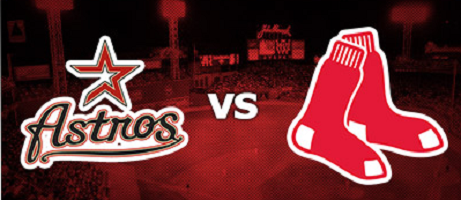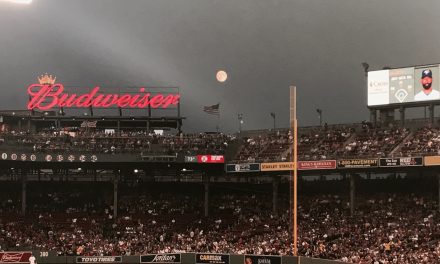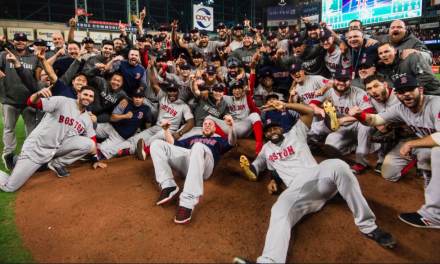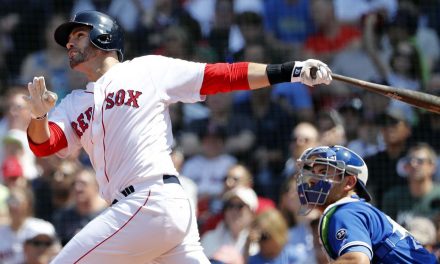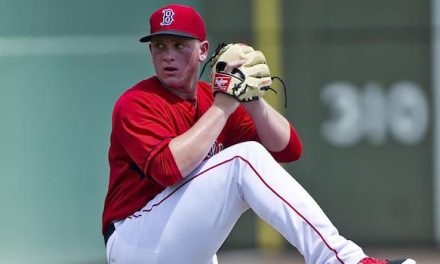On Thursday the Houston Astros and Boston Red Sox will start the best-of-five ALDS series. These two teams closed their regular seasons facing each other, so they had plenty of time to get acquainted. This series means a little more of course, and the two teams will pull out all stops to try and advance. Which team has the advantage at each position?
Starting Pitching
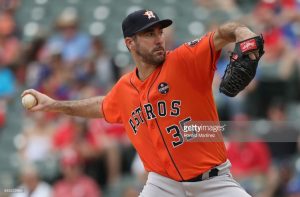
Justin Verlander #35 of the Houston Astros throws against the Texas Rangers at Globe Life Park in Arlington on September 27, 2017 in Arlington, Texas. (Photo by Ronald Martinez/Getty Images)
The Astros’ trade for Justin Verlander right before the waiver deadline has shored up their rotation. After a sub .500 month of August, people doubted the Astros’ legitimacy as a World Series contender. Behind Dallas Keuchel, their rotation had question marks. Lance McCullers got hurt after a hot start and hadn’t been pitching well since. Then Verlander arrived. Verlander went 5-0 with a 1.06 ERA for the Astros and they bounced back to go 21-8 from there on out. With Verlander and Keuchel at the front, the Astros have two aces. McCullers has been struggling, but Brad Peacock has had an excellent season for them, winning 13 games with an ERA of 3.00 and 11 strikeouts per nine. He would seem to be a fine option to slot in at number three.
The Red Sox have a Cy Young candidate in Chris Sale at the top. Following him is Drew Pomeranz, who somewhat quietly has put himself in a position for a potential top five finish in the Cy Young vote himself. Beyond that, though, the Red Sox have many questions. No one is quite sure yet who will be their #3 or 4 starters, and none of the options are altogether appealing.
Advantage: Astros
Bullpen
The Astros are strong at the back end of their bullpen, but if forced to dip into the pen earlier in games they could face issues. Closer Ken Giles is excellent, and Chris Devenski had a heck of a year for them striking out 100 batters. Will Harris is another excellent reliever for them, posting an ERA under 3.00 for the third consecutive season. No one else is reliable though. Their next best reliever, Luke Gregerson, had an ERA of 4.57.
The Red Sox bullpen is strong, and rather deep with options. It features Craig Kimbrel, possibly the best closer in the game. Kimbrel struck out 126 of 254 batters faced this season! He’ll be setup by Addison Reed, and possibly Joe Kelly and Carson Smith. Those are some solid pitchers, maybe not quite as good as the Astros setup men, but good. After that, the Red Sox depth shows much better. They have many quality options for relievers to make the roster, unlike the Astros whose fourth best wouldn’t make the Red Sox roster.
Advantage: Red Sox
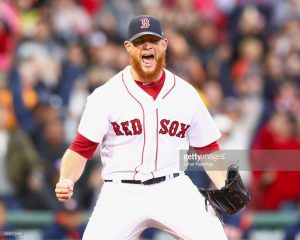
Craig Kimbrel #46 of the Boston Red Sox reacts after beating the Houston Astros and winning the AL East Division at Fenway Park on September 30, 2017 in Boston, Massachusetts. (Photo by Omar Rawlings/Getty Images)
Catcher
The two teams differ quite a bit at catcher. The Astros will pretty much just feature Brian McCann, while the Red Sox have two catchers in Christian Vazquez and Sandy Leon who should both get playing time. McCann is a low-batting-average hitter with good pop, whereas the Sox have Vazquez who batted .290 but with just five home runs. On the defensive side they are even more different. McCann is one of the worst defensive catchers in the league, who only threw out eight of 62 would-be base stealers. That 13% caught stealing rate pales in comparison to Christian Vazquez’ 42% and Sandy Leon’s 37% clip. Vazquez and Leon combined to throw out 39 base runners.
Advantage: Red Sox
First Base
The Astros have highly touted Cuban import Yuli Gurriel playing first. Gurriel had a nice first full season in the Majors, batting .299 with 18 homers and 43 doubles. He actually batted over .300 in every month except for May.
The Red Sox’ Mitch Moreland batted only .246, but thanks to his ability to draw walks, his .326 on base percentage is actually only six points behind Gurriel’s. He out- homered Gurriel 22-18, but his slugging percentage still lags behind. Moreland is probably better with the glove, having committed just five errors after winning the Gold Glove last season, but it’s not enough to make up the difference.
Advantage: Astros
Second Base
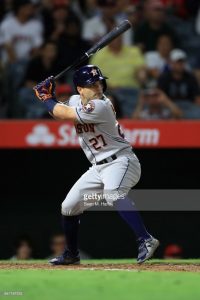
Jose Altuve #27 of the Houston Astros bats during a game against the Los Angeles Angels of Anaheim at Angel Stadium of Anaheim on September 13, 2017 in Anaheim, California. (Photo by Sean M. Haffey/Getty Images)
Dustin Pedroia is a high contact, good average hitter who is also an excellent defender. As much as I love Pedey, this is no contest.
Jose Altuve led the league with 204 base hits, becoming the first player ever to lead his league in hits in four straight seasons, collecting 200+ in each of them. Altuve came in third in the MVP vote a year ago and has a strong case for winning it this season. He led the league in hitting with a .346 average, while also popping 24 homers despite being 5’6″. Oh, he also stole 32 bases and missed reaching 40 doubles for the fourth consecutive year by just one double. He is one of the absolute best players in the league.
Advantage: Astros
Third Base
This is a fascinating match up. Both teams have a very good, young player at the position. Alex Bregman was the second overall pick in the 2015 draft and made the Majors by the next year. This year he batted .284 with 19 home runs and an .827 OPS.
Red Sox Rafael Devers has long been considered one of the highest upside players in the minor leagues, and he’s still only 20! In 58 games Devers matched Bregman’s .284 batting average while cracking 10 homers and posting an .819 OPS. Their numbers are almost identical and both are very highly touted.
Advantage: Push
Shortstop
Carlos Correa had been a fine shortstop his first two years, winning Rookie of the Year in 2015 and hitting 20 homers in both seasons. He took a step forward this year though, showing he could contend for best shortstop in baseball for many years to come. Correa batted .315 with an excellent .941 OPS this season.
As for the Red Sox, they have a very talented shortstop in Xander Bogaerts, but one who is maddeningly inconsistent. Bogaerts had a fantastic first half last season, only to fall way off in the second half. This year he again started hot before cooling off. At seasons end he had only batted .273 with 10 home runs while also making numerous baserunning mistakes. This is no contest.
Advantage: Astros
Left Field
The Astros have a variety of guys they play here, and Marwin Gonzalez may be the one they use. He has played all over however, and like Eduardo Nunez for the Sox, could be used in a variety of places. Cameron Maybin was aquired from the Angels to play outfield. He is adept at stealing bases, but his hitting prowess leaves something to be desired.
The Sox have a rookie to get excited about for years to come in Benny Biceps. He might not be as good now as he will be, but he is still a very good player already. Benintendi hit 20 home runs and stole 20 bases this season, the first rookie left fielder to accomplish that since Barry Bonds 30 years ago.
#RedSox Andrew Benintendi is the youngest left fielder with at least 20 homers and 20 stolen bases in a season since Barry Bonds in 1987.
— Ryan M. Spaeder (@theaceofspaeder) September 30, 2017
Advantage: Red Sox
Center Field
The Red Sox will usually have the advantage in the field here. Jackie Bradley is a wonderful defensive outfielder, routinely making spectacular throws and catches. He isn’t bad with the bat either, a bit inconsistent, but he gets the job done.
The Astros though have George Springer, a guy who hit 34 home runs this year. Springer also batted .283, showing he isn’t just a power hitter. His .889 OPS dwarfs Bradley’s .726 mark.
Advantage: Astros
Right Field
The Astros play former Red Sox Josh Reddick in right field, and he actually had one of his best seasons. Somehow, Josh Reddick batted .314 this year; not sure where that came from. Despite a down year from Mookie Betts, this isn’t really a contest. Betts almost won the MVP last year and is a very good fielder to boot. He hit 46 doubles this year and drove in 102 runners. His season may have left a bit to be desired, but the talent difference between these two is rather large.
Advantage: Red Sox
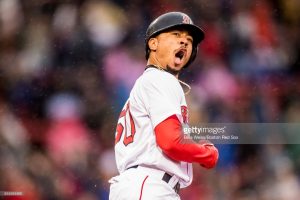
Mookie Betts #30 of the Boston Red Sox reacts as he rounds the bases after hitting a solo home run during the seventh inning of a game against the Houston Astros on September 30, 2017 at Fenway Park in Boston, Massachusetts. (Photo by Billie Weiss/Boston Red Sox/Getty Images)
Designated Hitter
Hanley Ramirez had a very disappointing follow up to his 2016 campaign, reverting back to the guy we saw in 2015 who swings wildly for the fences in every at bat. He only hit .242 and killed many rallies. He did manage to hit 23 home runs though, which is more than we can say for the Astros’ Carlos Beltran. Beltran, showing all of his 40 years, batted just .231 with 14 home runs and a devilish .666 OPS.
Advantage: Red Sox
Utility
I’m making a utility spot for the aforementioned Marwin Gonzalez and Eduardo Nunez. Both will probably play in more games than they won’t…if Nunez is healthy that is. Marwin Gonzalez had an out-of-nowhere breakout season. He batted .303 with 23 homers and 90 RBI this season, by far his best season to date. Nunez really helped kick start the Red Sox lineup after being acquired from the Giants, batting .321 with 8 home runs and a near .900 OPS for the Red Sox. Nunez’ Red Sox numbers extrapolated over a season would be similar to what Gonzalez has done, but is he healthy?
Slight Advantage: Astros
Final Analysis
So the final breakdown totals come to five advantages for the Astros, five advantages for the Red Sox, and two pushes. These teams are looking pretty even when it comes to which team has the advantage at each position. The Astros did win 99 games to the Red Sox 93 and finished the year stronger. They also have home field, so the overall advantage would have to go slightly to them, but this could be a good ALDS matchup. Sit back, watch, and hopefully enjoy.

